
|
#951 (9/29/23)

|
|
BY TONY FOURNIER |
|
Part Three focuses on Blue Lake Records, the subsidiary label of Parrot Records. Blue Lake artists included in this article are Red Saunders Orchestra, Joe Williams, Ann Carter,
Highlighted is the song "When The Sun Goes Down". |
AL BENSON Al Benson was a powerful deejay in Chicago's South Side. He was the owner of Parrot and Blue Lake Records.
CHICAGO TRIBUNE, June 26, 1948: WHO IS AL BENSON?
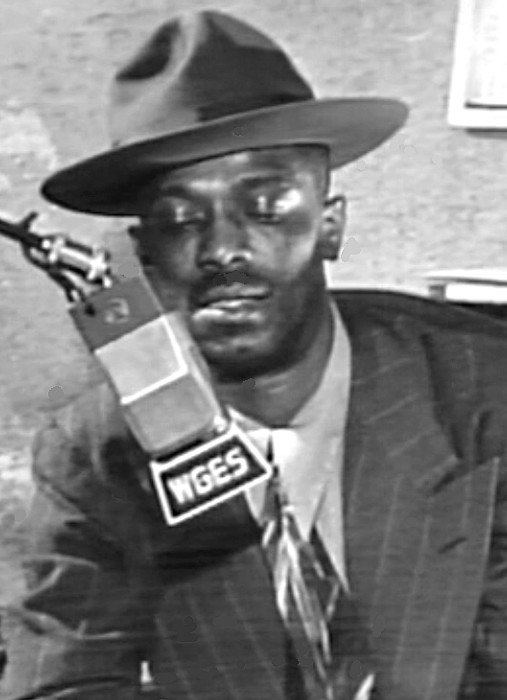
The phenomenal rise of Al Benson in a short three and a half years from one modest half hour air show a week to his present 38 hours of broadcasting in the same period is easier to understand when one studies his varied career.Born 38 years ago in Jackson, Miss., he attended high school and Normal College there, and became, while still a young man, Recreation Leader of Mississippi's Negro schools. He began singing and dancing when only seven with his father's jazz band. His ability to entertain was shown by his activities in promoting and producing musical comedies, minstrel shows, and concerts throughout the South.
The variety of Benson's talent explains his understanding of public likes and dislikes. During his high school and college days he worked as a cook on the Pennsylvania and Burlington railroads and can still toss together as delicious a meal as anyone could want.
He came to Chicago in 1929. He worked as a checker at Cuneo Press, as an interviewer for a project at the University of Chicago, and as a probation officer for the city.
He was pastor of his own church (non-denominational). His first radio show, less than four years ago, was a religious program. He regards his Sunday night gospel record program (WGES 11 p.m.) as the most successful of his 32 weekly shows. From listeners to his broadcasts he receives an average of 5,000 letters a week. (I'm just guessing, but I suspect this is more mail than is received by all other disc jockeys combined).
Benson is married and the father of three daughters, the oldest being 20. He owns his own home in which he lives modestly with his family. His record store at 4030 S. State Street is just one of several interests aside from his full-time radio activities. He also conducts a 14-piece orchestra, and has composed one tune, the "Benson Stomp"
He has more than 10,000 records in his radio collection—music ranging through swing, bebop, jazz, blues, and sweet. It is the diversity of his music, he feels, which has created the great listening audience he enjoys—an audience that ranges in age from two to 100.
Twenty Chicago and national firms are his sponsors. He does a show for Pepsi Cola every Sunday (WGES 4-5 p.m.), his famous "Battle of the Bands" show for Canadian Ace from the Savoy Ballroom every Thursday (WGES 7:30-8 p.m.), and daily broadcasts over WGES for Michigan Motor Mart, 2100 S. Michigan, the Morris Furniture Co., 547 E. 47th St., and others.
There is probably no harder working man in radio than the one who has just been voted "Chicago's Favorite Disc Jockey". His first show goes on the air at 10:30 a.m., and his last one signs off at 2 a.m.
BLUE LAKE RECORDS — THE 1954 BEGINNING
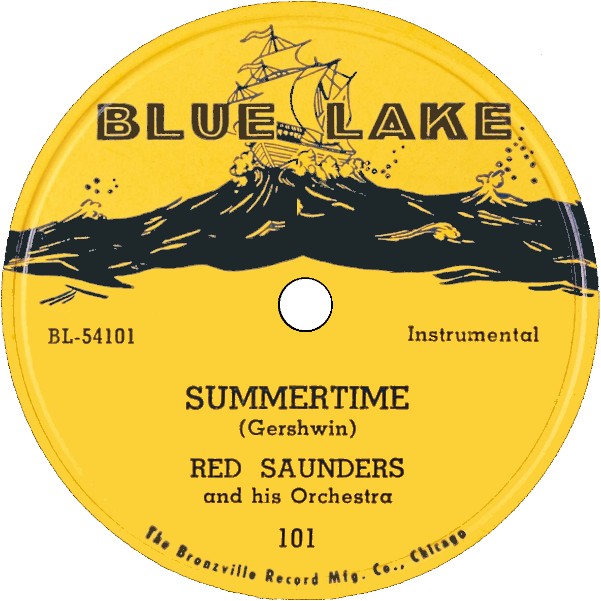
Blue Lake was a subsidiary of Parrot Records, located in Chicago, Illinois. Their standard numbering system started with #101, released in February 1954, and ended with #119, released in June 1956. There was also one gospel record, that on #1001, released in January 1955. The actual release of Blue Lake 110 has not been verified. So there are a known thirty-eight sides released on the label.
The first record issued on Blue Lake was two instrumentals by Red Saunders And His Orchestra. The first two digits in the Blue Lake matrix numbers seem to be the year of release. The last three digits indicate the number of the side released, in sequence (applies through Blue Lake 116).
THE CALL (Kansas City, Missouri, January 23, 1953:
1000 SALUTE CLUB DeLISA'S RED SAUNDERS
CHICAGO—One thousand Chicago well-wishers saluted Red "Hambone" Saunders last Tuesday at South Side's Club DeLisa, where Red celebrated his fifteenth year as drummer-man and orchestra leader.Headlining the long list of celebrities who attended the affair were Duke Ellington, Bill Bailey; singers Jimmy Grissom and Debbie Andrews; disc jockeys Al Benson, Daddie-O Daille, Sid McCoy, and Vivian Carter; columnist Dan Burley; singer Joe Williams, and Paris Club's emcee Freddie Gordon all acted as masters of ceremonies....
(NOTE: Joe Williams is the artist on Blue Lake 102. Vivian Carter is the "Vee" in Chicago's Vee-Jay Records.)
LISTEN (Windows Media Player):
1. "Summertime" - Red Saunders And His Orchestra - Blue Lake 101 - 1954.
2. "Riverboat" - Red Saunders And His Orchestra - Blue Lake 101 - 1954.BOTH SONGS played in sequence.
THE ARTISTS WILL BE PRESENTED IN THE ORDER OF THEIR FIRST RELEASE ON THE BLUE LAKE LABEL.
JOE WILLIAMS
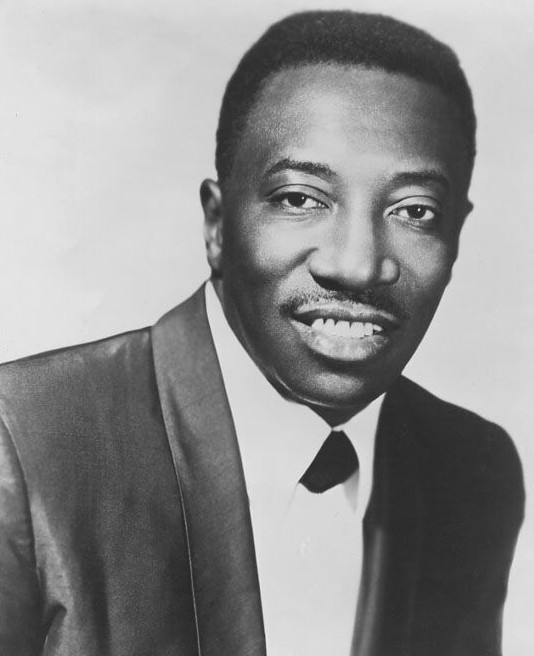
|
Above: Joe Williams, from Chicago's South Side, was a big band and blues singer and songwriter. In the early to mid-1940s, he performed with the Les Hite, Lionel Hamton, Red Saunders, and Andy Kirk orchestras. In the later 1940s, he was with the Todd Rhodes Orchestra. Joe was the featured singer with Count Basie's orchestra from 1954 to 1961. He's most known for his hit song, "Every Day I Have The Blues", released with Count Basie in 1955.
Joe's earliest records were on the Bluebird label. He recorded for many other labels, including Columbia/OKeh, Cincinnati, Decca, VITAcoustic, Sensation, Clef, Verve, and Roulette. He had just the one record on the Blue Lake label.
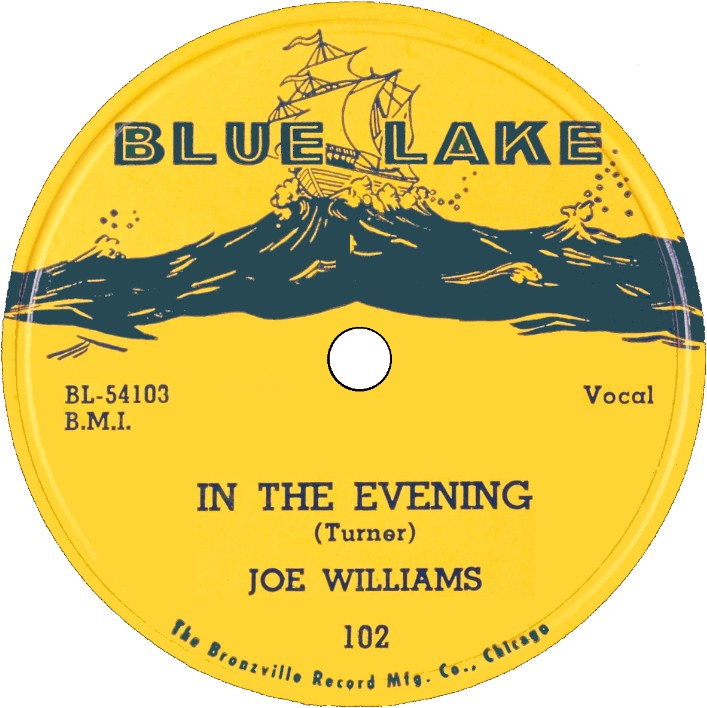
|
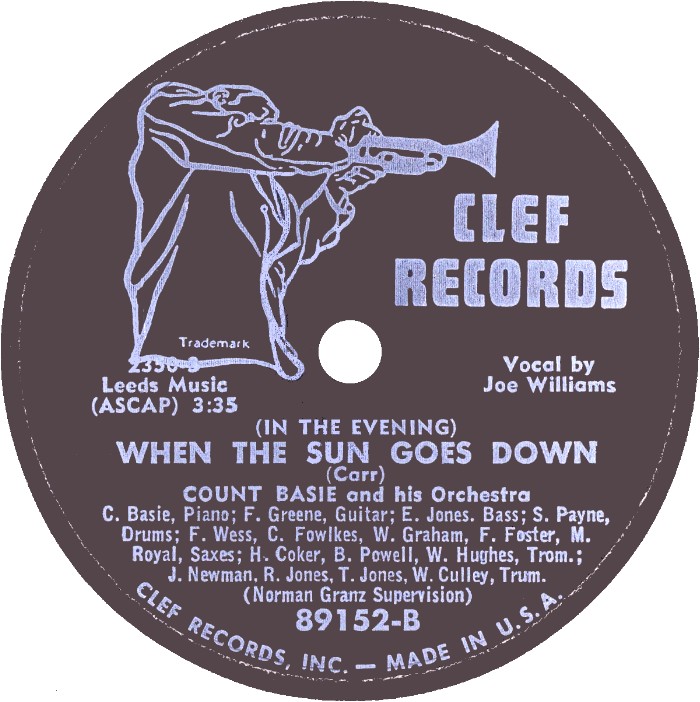
|
Above Left: Label image for Blue Lake 102, recorded in late 1953 and released in February 1954. The flip-side, "Tired Of Moving", is the same song sold by Al Benson to Savoy, retitled "Time For Moving", and released on Savoy 1165-B in 1955. Above Right: Label image for Clef 89152-B, released in 1955. Clef Records was located in Beverly Hills, California.
CASH BOX, January 17, 1953:
....Joe Williams, the Okeh recording artist, reports that he may desert the blues field and lean more to the ballad style. His "Everyday" sold well and it was a definite jump blues type. Maybe the singer knows what heís doing....CASH BOX, August 29, 1953:
....Al Benson has the Parrot label in speedy action. The firm just signed up four stars: Coleman Hawkins, Leo Parker, Joe Williams, and Curtis Jones....
NOTE: There were no releases by Leo Parker on either Parrot or Blue Lake.LISTEN (Windows Media Player):
1. "In The Evening" - Joe Williams - Blue Lake 102 - 1954.
2. "Tired Of Moving" - Joe Williams - Blue Lake 102 - 1954.
3. "When The Sun Goes Down" - Count Basie Orchestra (Vocal By Joe Williams) - Clef 89152-B - 1955.ALL THREE SONGS played in sequence.
Above Left: Joe Williams, standing at the microphone, with the Count Basie Orchestra. Above Right: CASH BOX, December 31, 1955: THERE'S YOUR NAME, JOE
CINCINNATI—When Joe Williams, Count Basie vocalist who hit with "Every Day", stopped up at WCIN, this city, the first thing he did was grab an available Cash Box to see the results of the recent Juke Box Poll.
Joining in the friendly ribbing were, from left to right, Herman Griffith, staff announcer; Long, Tall, Lean, Lanky Larry Dean, program director; Joe; Joel Turnero; and Charles "Bugs" Scruggs, chief announcer.
(NOTE: Joel Turnero was a songwriter and WNJR disc jockey. Is it possible that the "Turner" shown on the above Blue Lake label is intended to be him?)
EXTRA RECORD — RED SAUNDERS AND JOE WILLIAMS
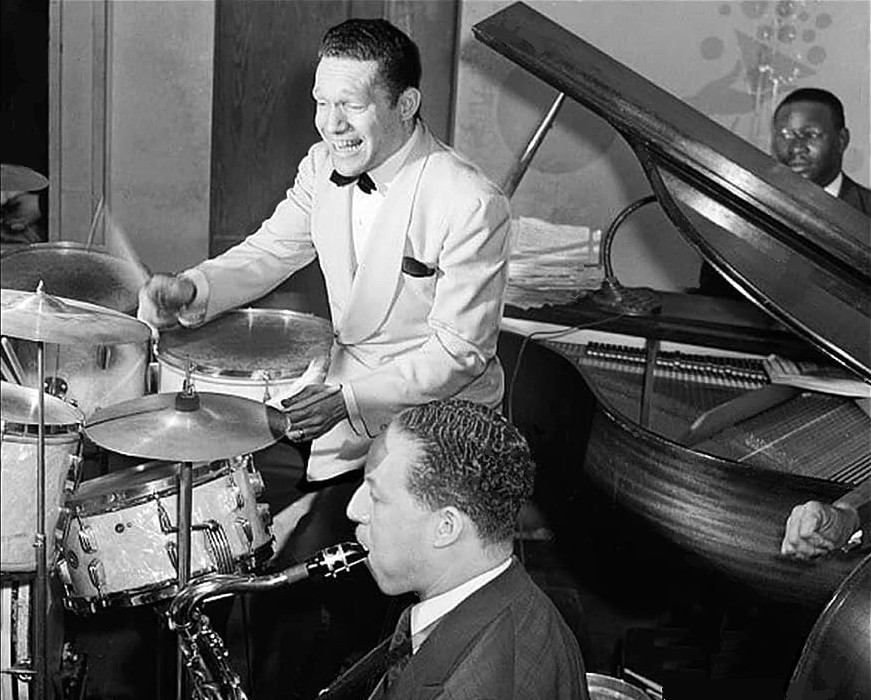
|
Red Saunders, from Chicago, was a drummer and orchestra leader. He led the house band at the Club DeLisa, Chicago, from 1938 until the club closed in 1958 (except between 1945 and 1947). Red's band recorded mainly for Columbia's subsidiary label, OKeh, from the early to mid-1950s. His signature song was "Hambone", released on OKeh in 1951. He had one record for Blue Lake, the new label's first release.
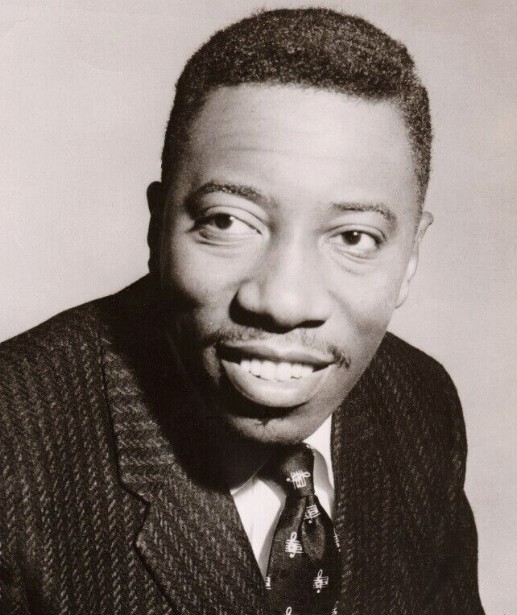
|
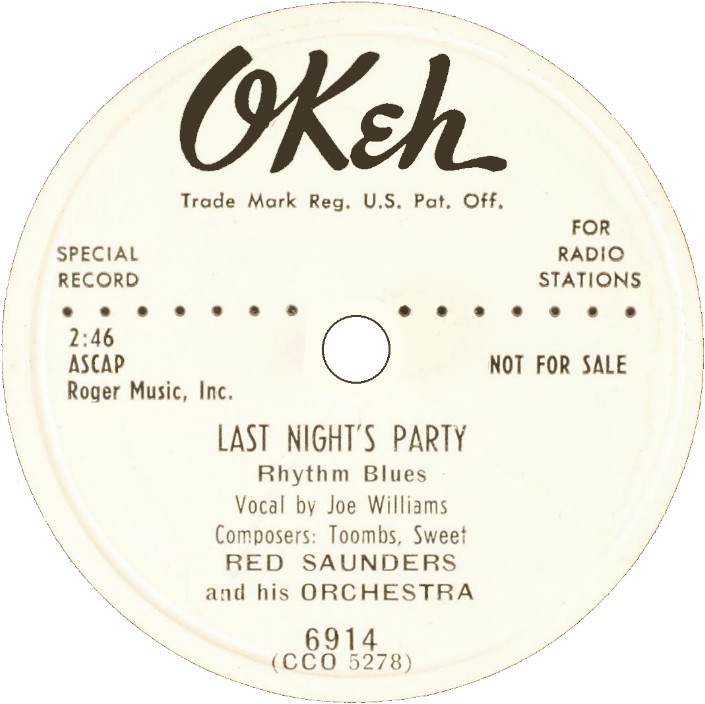
|
Above Left: Joe Williams. Above Right: Label image for OKeh 6914, released in 1952. The record is in the similar vein as Louis Jordan's 1949 song, "Saturday Night Fish Fry".
CASH BOX, November 8, 1952:
....Red (Hambone) Saunders has just completed a mailing to over 400 deejays, thanking them for past favors and proudly pointing to his newest "Last Nightís Party", which features Joe Williams. The latter is working a West Madison Street spot, called the Paris Club. This district is fast becoming the new R & B area for the Windy City and we find places revamping their policies so as to take in R & B talent, thus providing badly needed new employment outlets....LISTEN (Windows Media Player):
"Last Night's Party" - Red Saunders And His Orchestra (Vocal By Joe Williams) - OKeh 6914 - 1952.
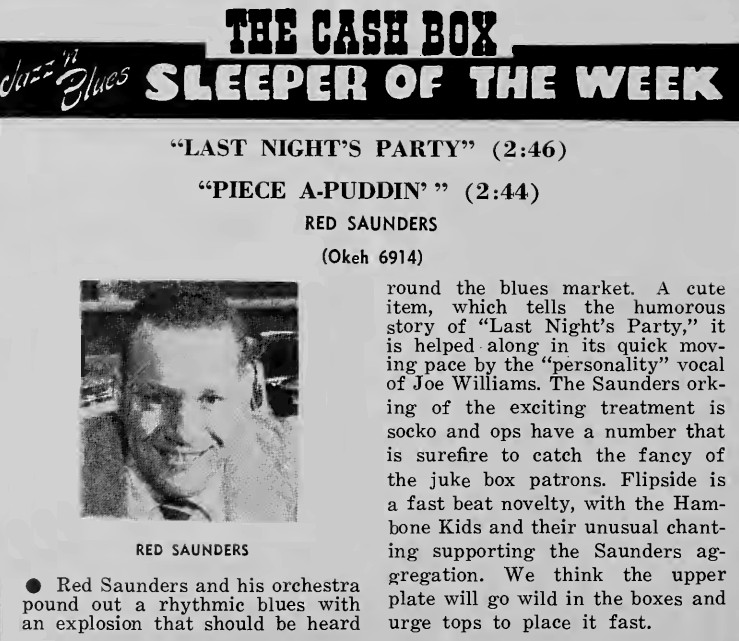
|
EXTRA RECORDS — WHEN THE SUN GOES DOWN
The song "(In The Evening) When The Sun Goes Down" was composed by Leroy Carr. He was a blues singer, pianist, and songwriter. He recorded the song in February 1935 and it was released on Bluebird 5877 the following month.
Other artists with records of this song in the 1930s and 1940s are Josh White, Bumble Bee Slim, Memphis Minnie, The Ink Spots, Alton Redd, Cecil Gant, Wynonie Harris, Jimmy Witherspoon, Duke Henderson, and Charles Brown.
Yes, Leroy Carr is the true composer of this song, but you may not know that from looking at the various record labels. As already seen, the Blue Lake label credits "Turner". Both ASCAP and BMI credit a song titled "When The Sun Goes Down" to "Eric Aylward Turner".
But consider that BMI lists 267 works that are titled "When The Sun Goes Down" and another 59 listed for "In The Evening". These are, for the most part, completely different songs. So using an incorrect composer name accidentally on the record label can happen. Just in case you are wondering, Big Joe Turner did sing this song on an album in 1950.
This said, there are also obvious steals, such as Jimmy Witherspoon not showing a composer on the record label, but crediting himself at BMI. Alton Redd directly credits himself on his record label. On Wynonie Harris' record, Hamp-Tone Records' owner Lionel Hampton takes composer credit on the label.
Bumble Bee Slim's record has "Easton" as composer on the label, which is Slim's real name. And Cecil Gant claims "Words And Music By Cecil Gant" on his label.
Or, you can try what Memphis Slim did, get BMI composer credit by using a fudged title, "When Your Love Is Not Around".
At Near Right: Photo of Leroy Carr, composer of "When The Sun Goes Down".
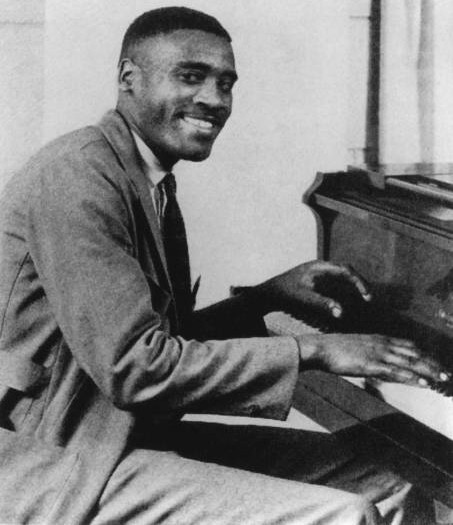
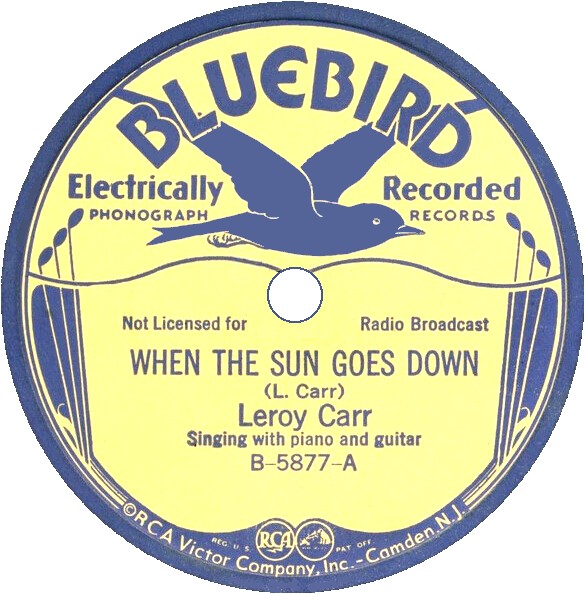
LISTEN (Windows Media Player):
"When The Sun Goes Down" - Leroy Carr - Bluebird B-5877-A - 1935.
THE FOLLOWING VERSIONS OF THE SONG REPRESENT A WIDE ARRAY OF ARRANGEMENTS:
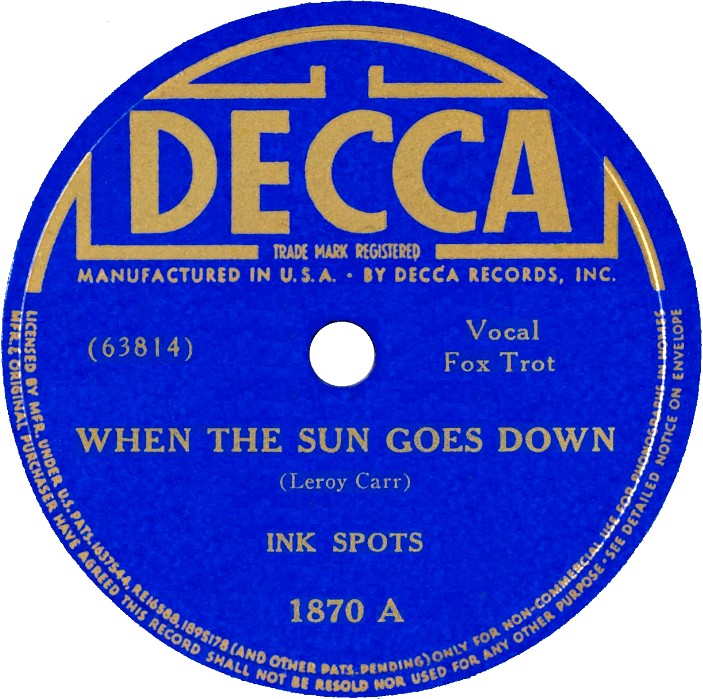
|
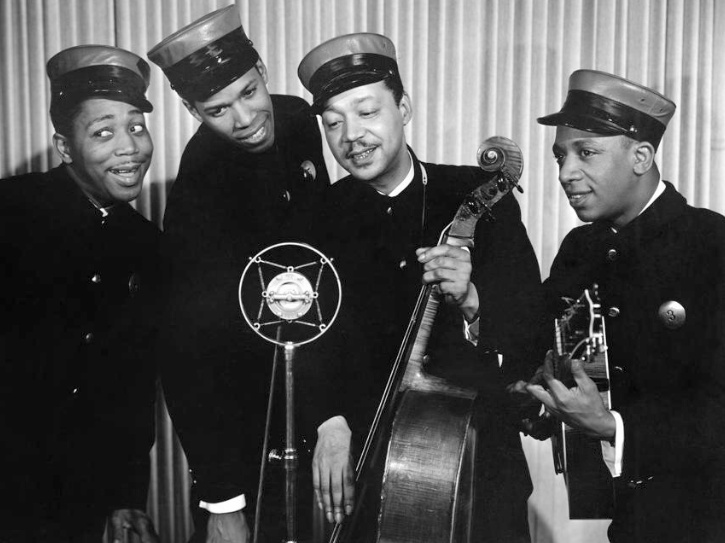
|
Above Left: Label image for Decca 1870 A , recorded in May 1938 and released in 1938. Above Right: Photo of The Ink Spots, from the 1941 film, "The Great American Broadcast", (L-R) Deek Watson, Bill Kenny, Hoppy Jones, and Charlie Fuqua. It's the line-up for this record.
([This photo provided by Hans-Joachim Krohberger.])LISTEN (Windows Media Player):
"When The Sun Goes Down" - The Ink Spots - Decca 1870 A - 1938.
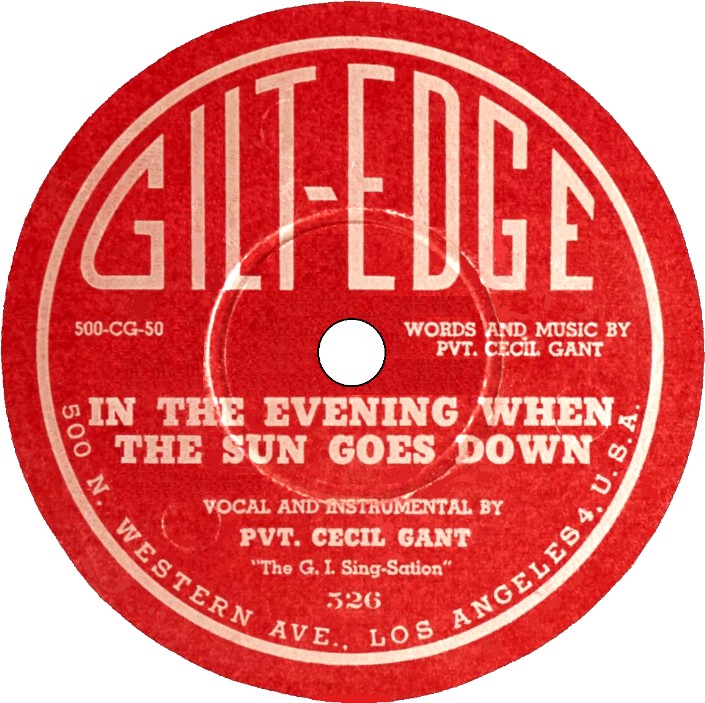
|
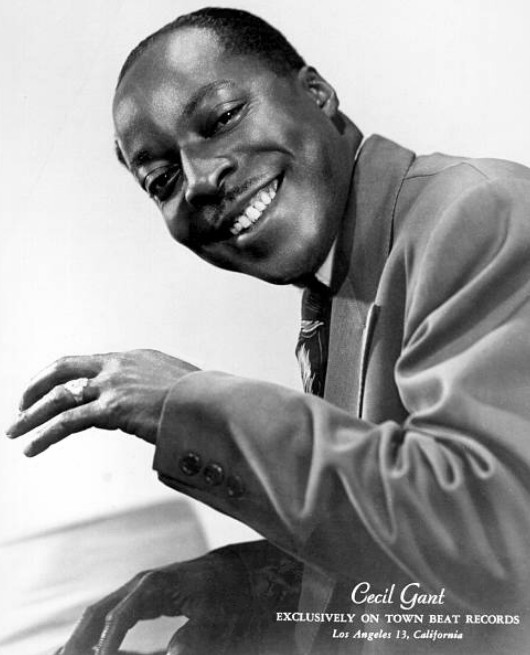
|
Above Left: Label image for Gilt-Edge 526, released in 1945. Above Right: Photo of Cecil Gant. He was a singer, piano player, songwriter, and orchestra leader. In 1944/1945, he came on the scene with a huge hit, "I Wonder". Sadly, he had only six more years to enjoy his fame.
LISTEN (Windows Media Player):
"In The Evening When The Sun Goes Down" - Pvt. Cecil Gant - Gilt-Edge 526 - 1945.
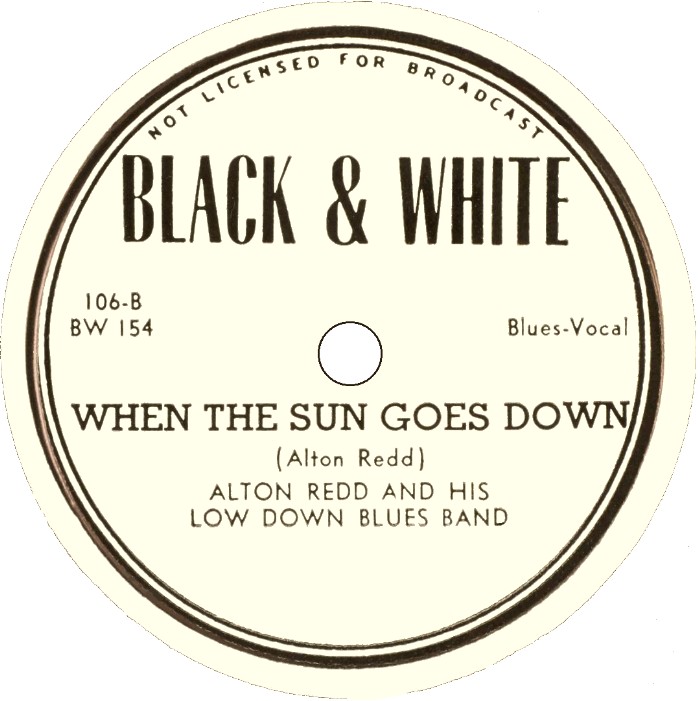
|
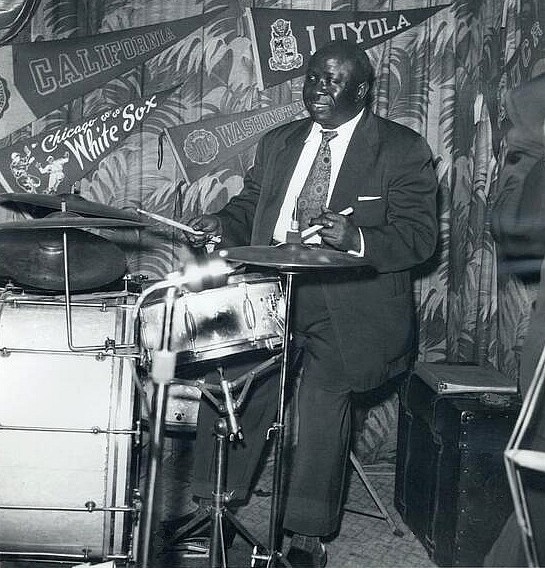
|
Above Left: Label image for Black & White 106-B, released in 1945. Above Right: Photo of Alton Redd, who was a singer, drummer, and bandleader.
LISTEN (Windows Media Player):
"When The Sun Goes Down" - Alton Redd And His Low Down Blues Band - Black & White 106-B - 1945.
Above Left: Label image for Hamp-Tone 103, released in 1946. The label lists the musicians' names. Herbie Fields, clarinet, would lead his own orchestra for two records on the Parrot label in 1953. Joe Morris, trumpet, later had his own orchestra, recording several records for the Atlantic and Herald labels.
Above Middle: Label image for the same record, except on Hamp-Tone 1001. Note the vibraphone which was the instrument played by Lionel Hampton.
Above Right: Photo of Wynonie Harris. Known as Wynonie "Mr. Blues" Harris, he had records on Decca, Philo/Aladdin, and Apollo prior to Hamp-Tone. Afterwards, he moved to King Records, hitting there with the classic "Good Rockin' Tonight".
LISTEN (Windows Media Player):
"In The Evenin' Blues" - Wynonie Harris - Hamp-Tone 103 - 1946.
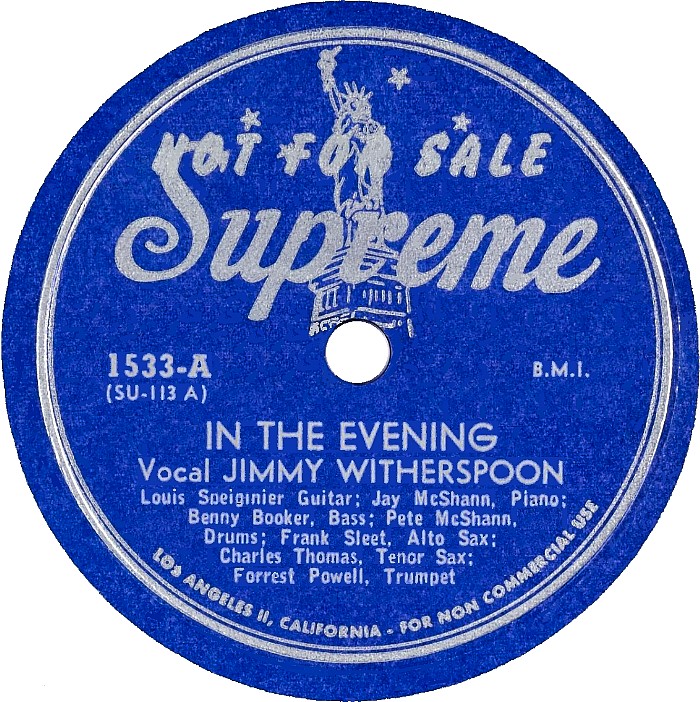
|
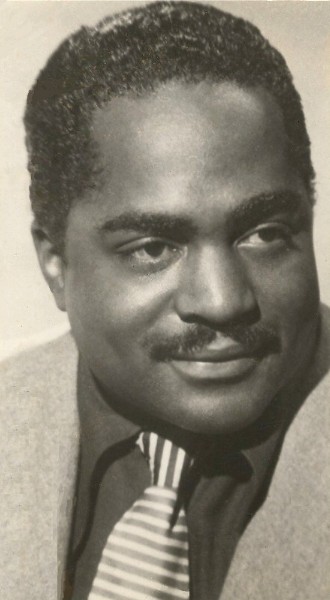
|
Above Left: Label image for Supreme 1533-A, released in 1949. Above Right: Photo of Jimmy Witherspoon. ([This photo courtesy of Paul Ressler.])
LISTEN (Windows Media Player):
"In The Evening" - Jimmy Witherspoon - Supreme 1533-A - 1949.
LISTEN TO ALL FIVE SELECTIONS (Windows Media Player):
1. "When The Sun Goes Down" - The Ink Spots - Decca 1870 A - 1938.
2. "In The Evening When The Sun Goes Down" - Pvt. Cecil Gant - Gilt-Edge 526 - 1945.
3. "When The Sun Goes Down" - Alton Redd And His Low Down Blues Band - Black & White 106-B - 1945.
4. "In The Evenin' Blues" - Wynonie Harris - Hamp-Tone 103 - 1946.
5. "In The Evening" - Jimmy Witherspoon - Supreme 1533-A - 1949.ALL FIVE SONGS played in sequence.
ANN CARTER
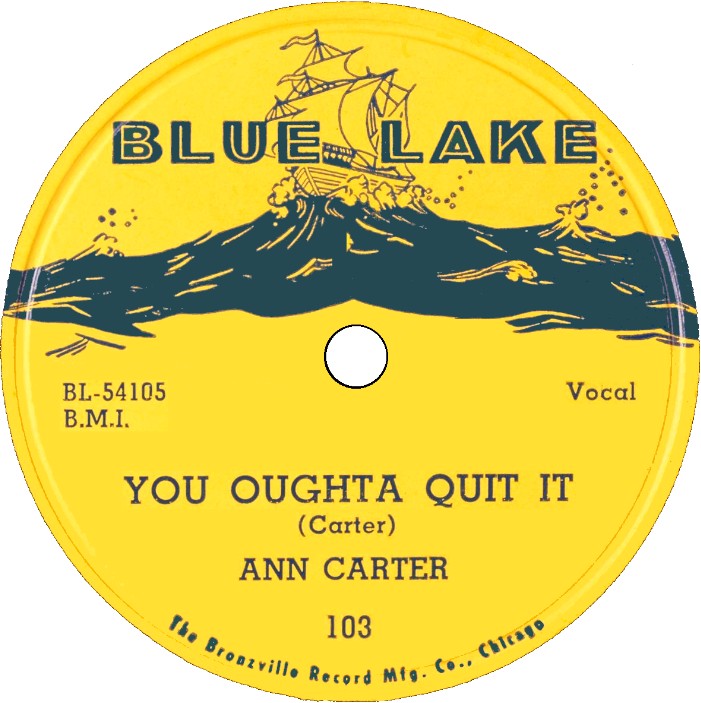
|
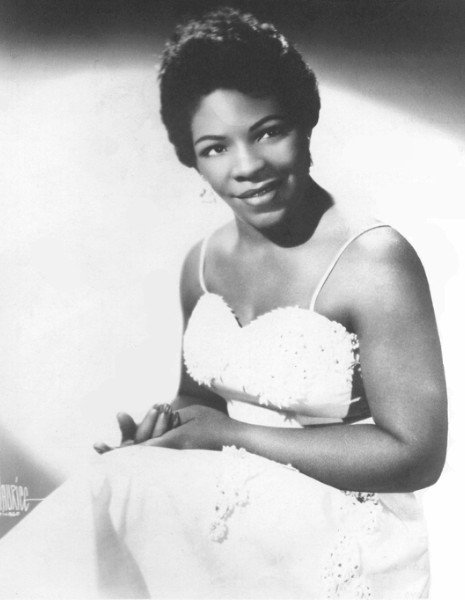
|
Above Left: Label image for Blue Lake 103, recorded in February 1954 and released in June 1954. Labels for both sides show "Carter" as composer. BMI.com agrees with "Your Lovin Daddy", but has no listing for the flip-side, "You Oughta Quit It". Above Right: Photo of Ann Carter from 1954. Not much is known about her. This seems to be her only record. No related ads or reviews were found in either The Billboard or Cash Box magazines.
(Above photo courtesy of Barbara Berry)CHICAGO DEFENDER, July 17, 1954:
New blues shouters are cropping up all over with acclaim from wax agencies and purchasers as well. One of the latest is Ann Carter, Los Angeles thrush, whose disc "Loving Daddy Blues" is socko with juke box fans....LISTEN (Windows Media Player):
1. "You Oughta Quit It" - Ann Carter - Blue Lake 103 - 1954.
2. "Lovin Daddy Blues" - Ann Carter - Blue Lake 103 - 1954.BOTH SONGS played in sequence.
KING FLEMING QUINTETTE
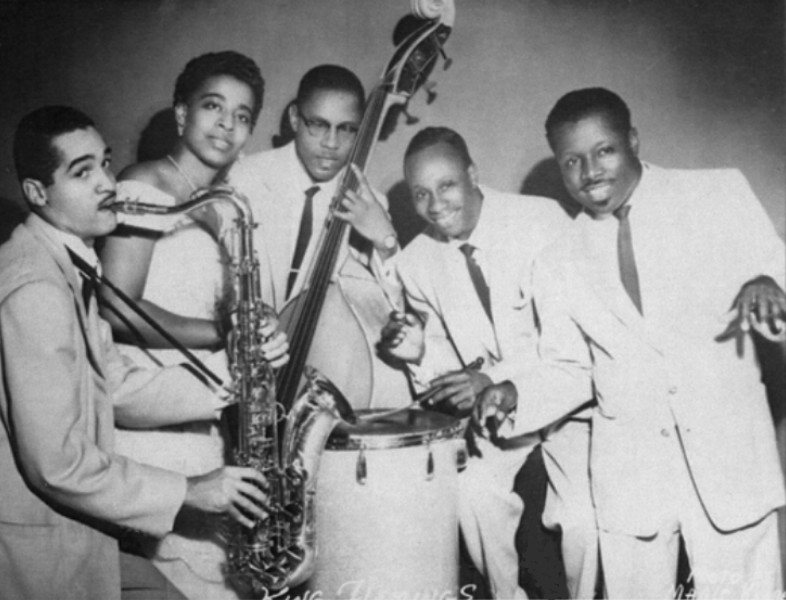
|
Above: Photo of King Fleming Quintette. The female is Lorez Alexandria. King Fleming, the piano player in the group, is at far right. Also on their Blue Lake record are John Neely (tenor saxophone), Russell Williams (bass fiddle), and Aubrie Jones (drums).
Above Left: Label image for Blue Lake 104, recorded in March 1954 and released in June 1954. This label states "Instrumental", but it is singing by Lorez Alexandria with vocal backing by the group. The flip-side label states "Vocal—Instrumental" and is a similar situation. The "William's Blues" composer is not Russell Williams, the group's bass player, but rather Jacob Ash William. BMI.com lists "Ash William" as the composer and "performer" of this song. The flip-side, "One O'Clock Jump", of course was composed and made famous by Count Basie.
Above Middle: Photo of Lorez Alexandria.
([This photo provided by Gilles Pétard.])Above Right: Walter "King" Fleming was a pianist and bandleader. He spent most of his career in Chicago, except for a stay in Los Angeles in the mid-1940s. Fleming had one record on the Blue Lake label. He later had records on King, Argo, and Cadet... the latter two were Chess Records subsidiaries.
At Direct Right: Photo of The King Fleming Band.
WISCONSIN STATE JOURNAL, June 17, 1953:
The King Fleming Four, vocal and instrumental group, has begun an engagement at the Dell View Hotel, Lake Delton. Members are King Fleming, piano; Aubrey Jones, drums and voice; Russell Williams, bass fiddle; and Lorez Alexandria, voice.In the last year, the quartet has performed at the Brass Rail and 123 Club in Chicago and at the Cloco Cocktail Lounge in Milwaukee....
LISTEN (Windows Media Player):
1. "William's Blues" - King Fleming's Quintette - Blue Lake 104 - 1954.
2. "One O'Clock Jump" - King Fleming's Quintette - Blue Lake 104 - 1954.BOTH SONGS played in sequence.
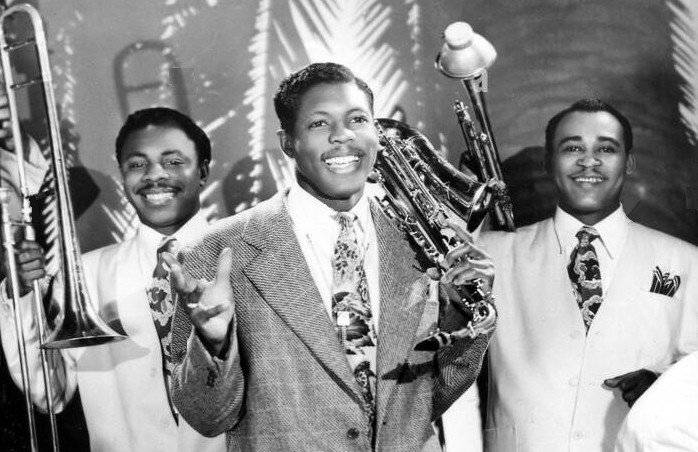
NEWSPAPER CLIPPINGS — KING FLEMING:
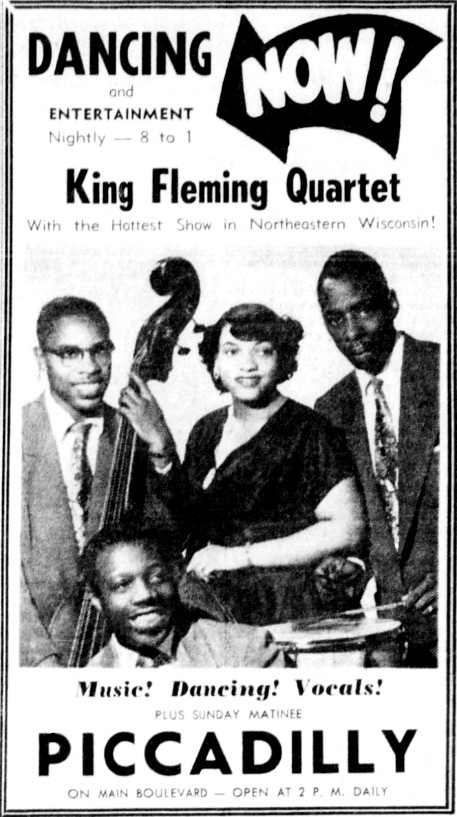
|
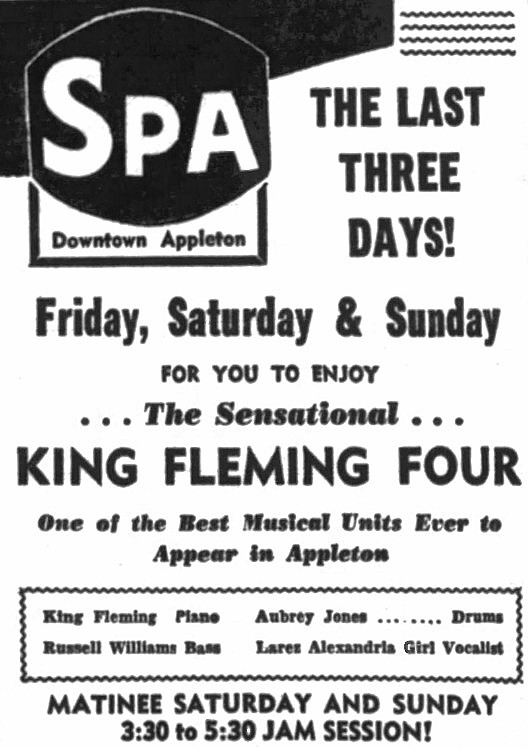
|
Above Left: GREEN BAY PRESS GAZETTE, January 23, 1953.
NOTE: In picture (L-R) Russell Williams, King Fleming, Lorez Alexandria, and Aubrie Jones.Above Right: POST-CRESCENT (Appleton, Wisconsin), April 24, 1953.
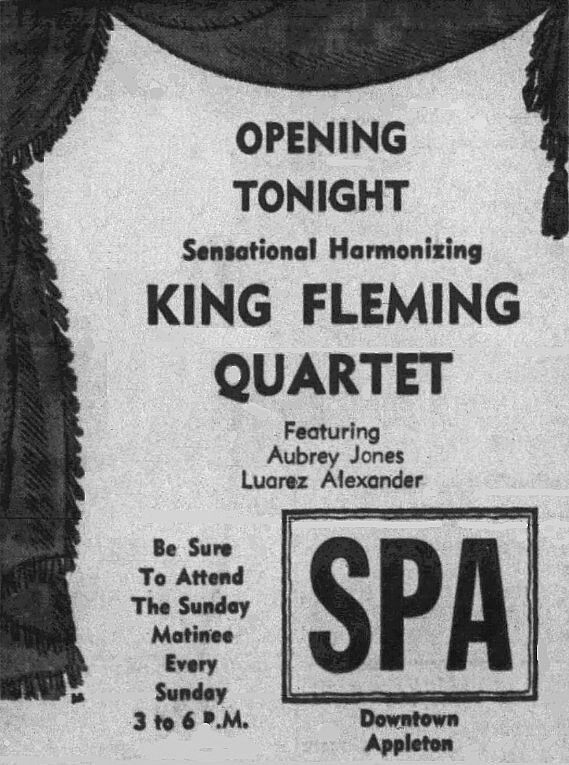
|
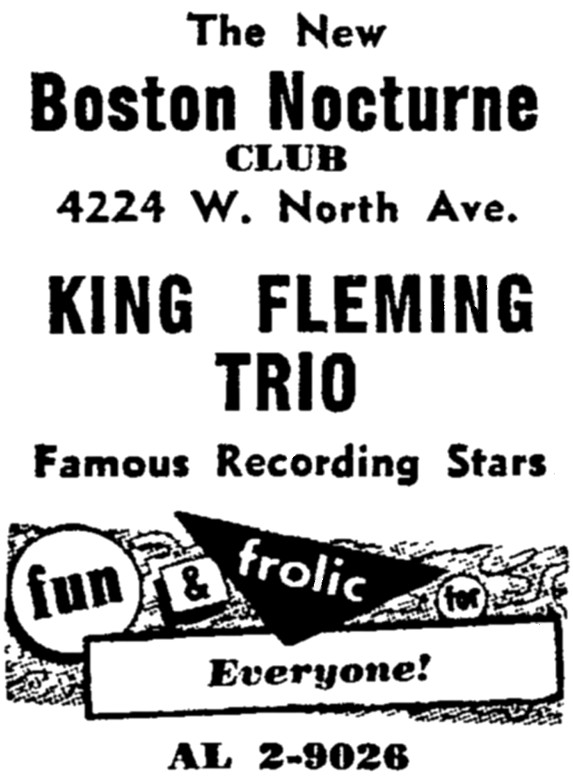
|
Above Left: POST-CRESCENT (Appleton, Wisconsin), November 6, 1956.
NOTE: Strange that they didn't mention their fourth member.Above Right: SUBURBANITE ECONOMIST (Chicago, Illinois), November 19, 1958.
NOTE: At various times, King Fleming performed as a single, duo, trio, quartet, and quintette. In addition, he led his own big band in the early 1940s.
EXTRA RECORDS — KING PERRY WITH WALTER "KING" FLEMING:
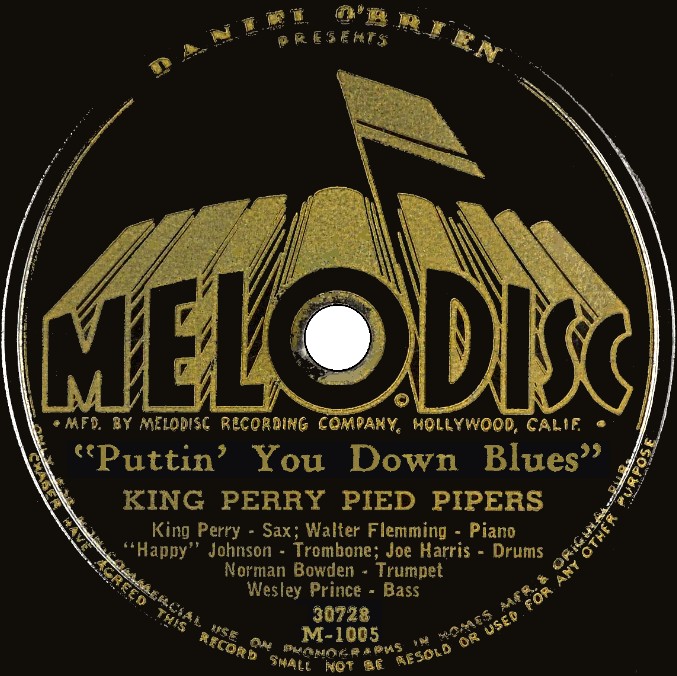
|
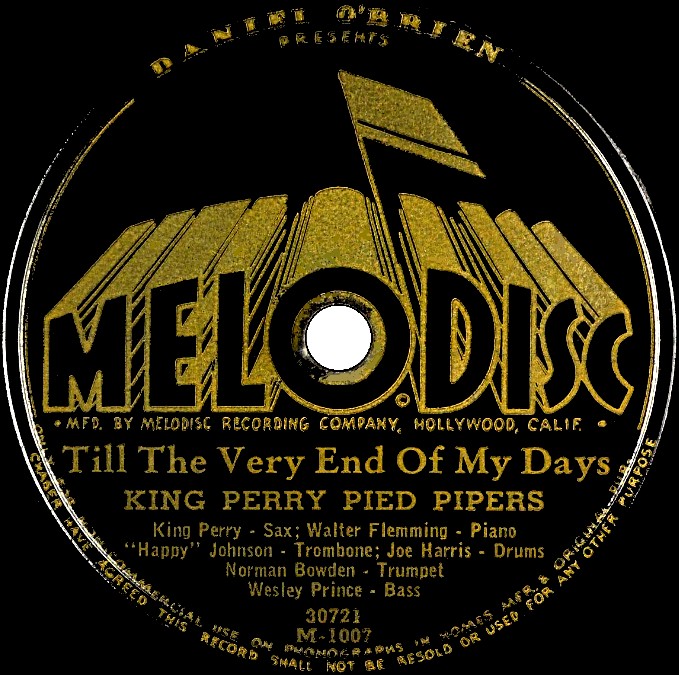
|
Above Left: Label image for Melodisc M-1005, released in March 1946. This is Oliver "King" Perry's group with "King" Fleming playing piano. The label shows him as "Walter" Flemming [sic], perhaps in deference to his bossman named "King". Above Right: Label image for Melodisc M-1007, released in March 1946. Melodisc M-1006 was also by the King Perry Pied Pipers.
At Direct Right: Photo of King Perry.
Oliver Hazart "King" Perry was a saxophonist, clarinetist, bandleader, composer, and arranger. More information and recordings by him are at Specialty Records - Part Four.At Far Right: SALT LAKE TRIBUNE, August 2, 1946. (King Perry)
PITTSBURGH COURIER, April 27, 1946: KING PERRY IN CHICAGO
LOS ANGELES—King Perry, the Pied Piper of Swing, returned this week to Chicago after a very successful stay of engagements on the West Coast.During the King's eighteen month stay he appeared at some of Hollywood's most popular clubs including the Streets Of Paris, Jade Club, Radio Room, and Shepp's Playhouse.
In San Francisco, his aggregation scored at the Backstage Cafe. The King was also spotlighted at one of the series of concerts sponsored by the San Francisco Jazz Foundation at the California Theatre Restaurant.
While in Hollywood, the band waxed several sides for Melodisc Records, including "Baby Baby Blues" and "Puttin' You Down Blues".
While in the East and Midwest Perry has scheduled a series of club and theatre dates. He expects to revisit his old haunts in Cleveland, Kansas City, Cincinnati, and Pittsburgh.
The versatile young maestro plans to return to Hollywood next Fall.
LISTEN (Windows Media Player):
1. "Puttin' You Down Blues" - King Perry's Pied Pipers - Melodisc M-1005 - 1946.
2. "Till The Very End Of My Days" - King Perry's Pied Pipers - Melodisc M-1007 - 1946.
3. "Laughing At Life" - King Perry's Pied Pipers - Melodisc M-1007 - 1946.ALL THREE SONGS played in sequence.
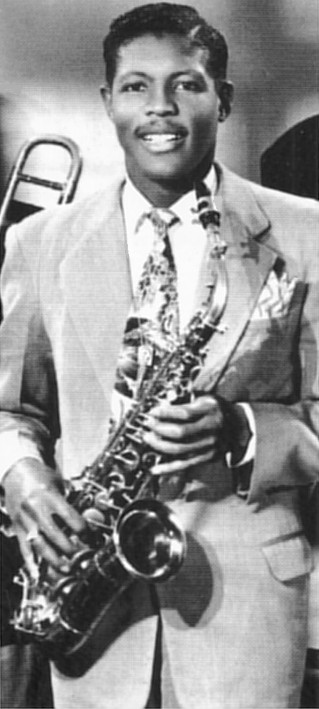
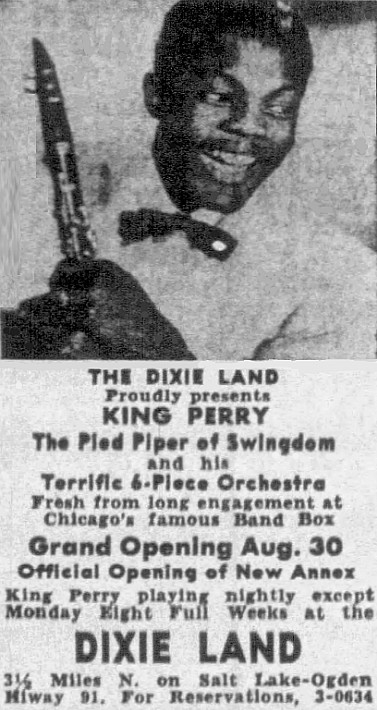
SUNNYLAND SLIM
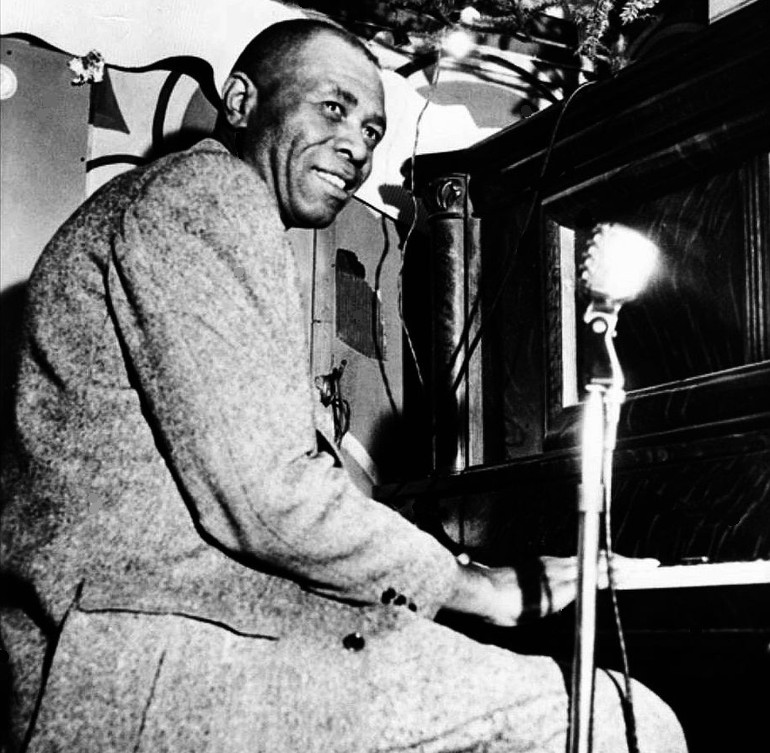
|
Above: Photo of Sunnyland Slim, who was a blues singer, piano player, band leader, and songwriter. He moved to Chicago in the early 1940s. His recording career went from 1947 to 1985. Some of the 1940s/1950s labels he recorded with are Hytone, Mercury, Apollo, Regal, Chance, Blue Lake, Cobra, and J.O.B. Sunnyland was part owner of J.O.B., a Chicago record company. For Blue Lake, he had two released records.
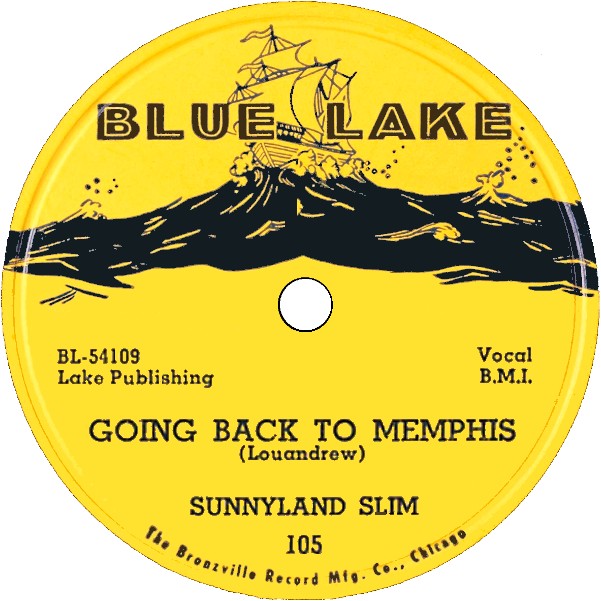
|
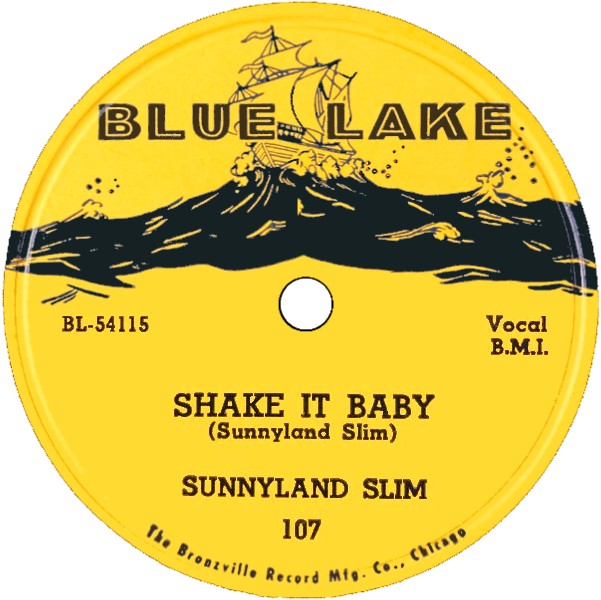
|
Above Left: Label image for Blue Lake 105, recorded in early 1954 and released in July 1954. Labels on both sides credit "Louandrew" [sic] as composer. Albert Luandrew is Sunnyland Slim's real name. Above Right: Label image for Blue Lake 107, recorded in early 1954 and released in late 1954. "Shake It Baby" was also released on J.O.B. 1105, also in July 1954, but with a different flip-side. Not fully verified, but it seems that Ernest "Big" Crawford is playing the bass fiddle on the flip-side, "Bassology".
LISTEN (Windows Media Player):
1. "Going Back To Memphis" - Sunnyland Slim - Blue Lake 105 - 1954.
2. "Devil Is A Busy Man" - Sunnyland Slim - Blue Lake 105 - 1954.
3. "Shake It Baby" - Sunnyland Slim - Blue Lake 107 - 1954.
4. "Bassology" - Sunnyland Slim - Blue Lake 107 - 1954.ALL FOUR SONGS played in sequence.
EXTRA RECORD — SUNNYLAND SLIM
Above Left: Photo of Sunnyland Slim at the piano. Above Right: Label image for RCA Victor 20-3085-B, released in August 1948. The composer shown on the labels for both sides is "Albert Luandrew", Sunnyland's real name. This is Sunnyland's first record in his long recording career. It was recorded in 1947, but not released until 1948.
Seems strange to use the pseudonym "Dr. Clayton's Buddy" when "(Sunnyland Slim)" is identified just below it, but some notoriety was supposedly gained from it. Dr. Clayton himself is Peter Cleighton, a blues singer that Sunnyland had worked with in Chicago night clubs.
LISTEN (Windows Media Player):
1. "Across The Hall Blues" - Dr. Clayton's Buddy (Sunnyland Slim) And His Orchestra - RCA Victor 20-3085-B - 1948.
2. "Broke And Hungry" - Dr. Clayton's Buddy (Sunnyland Slim) And His Orchestra - RCA Victor 20-3085-A - 1948.BOTH SONGS played in sequence.
THE VETERAN SINGERS
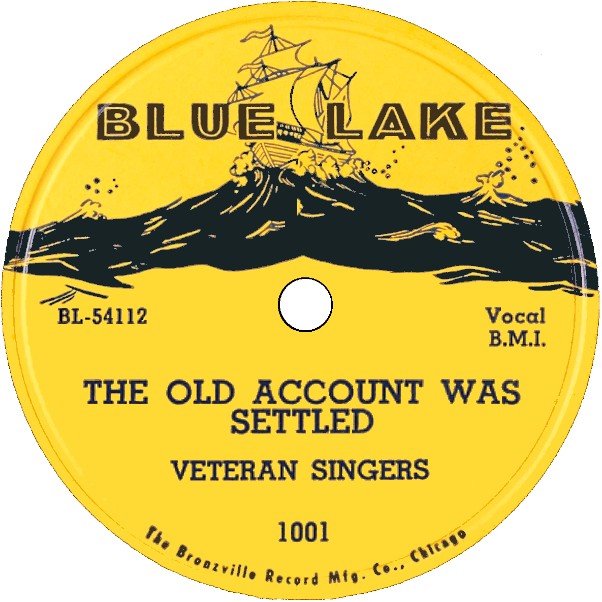
The Veteran Singers were a Detroit male gospel vocal quintet. Their total record output was two on Chicago's States Records in 1952 and this one on Blue Lake Records.
At Left: Label image for Blue Lake 1001, recorded in early 1954 and released in January 1955. It's the only gospel record that was issued on the Blue Lake label. This record was also released on Parrot 1001 at the same time.
Cash Box Review (2/5/55):
VETERAN SINGERS — Blue Lake 1001
Give It Up (B) A rhythmic bouncing spiritual well done by the Veteran Singers. Deck has a beat and melodic content that will appeal to all.
The Old Account Was Settled (C+) Shouty lead on a middle tempo item engenders an excitement against a mild answer from the other singers who keep the beat.
(NOTE: A rating of C+ was considered as "good" and B as "very good".)LISTEN (Windows Media Player):
1. "The Old Account Was Settled" - Veteran Singers - Blue Lake 1001 - 1955.
2. "Give It Up" - Veteran Singers - Blue Lake 1001 - 1955 .BOTH SONGS played in sequence.
BABY BOY WARREN
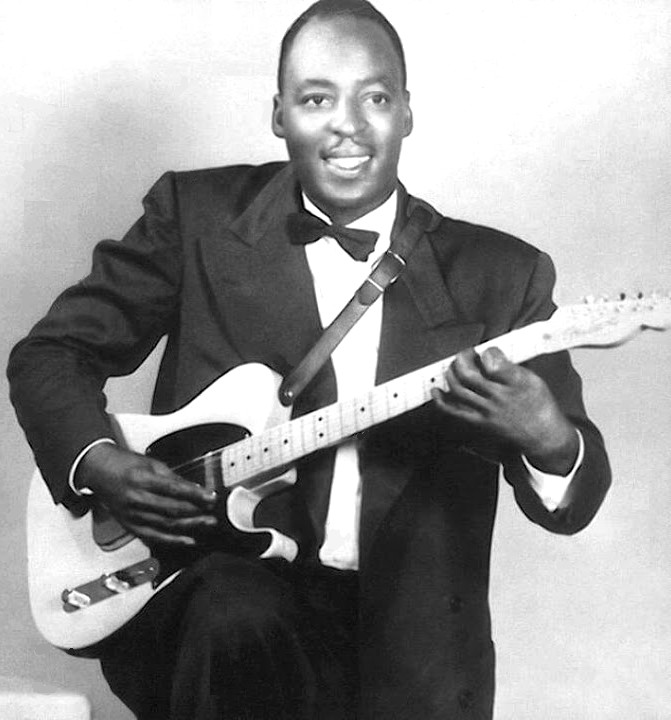
|
Above: Photo of Baby Boy Warren, aka Robert Henry Warren, moved to Detroit in the early 1940s. He was a blues singer, guitarist, and songwriter. Baby Boy recorded for the Detroit labels Staff, JVB, and Drummond. He had just one record on the Blue Lake label.
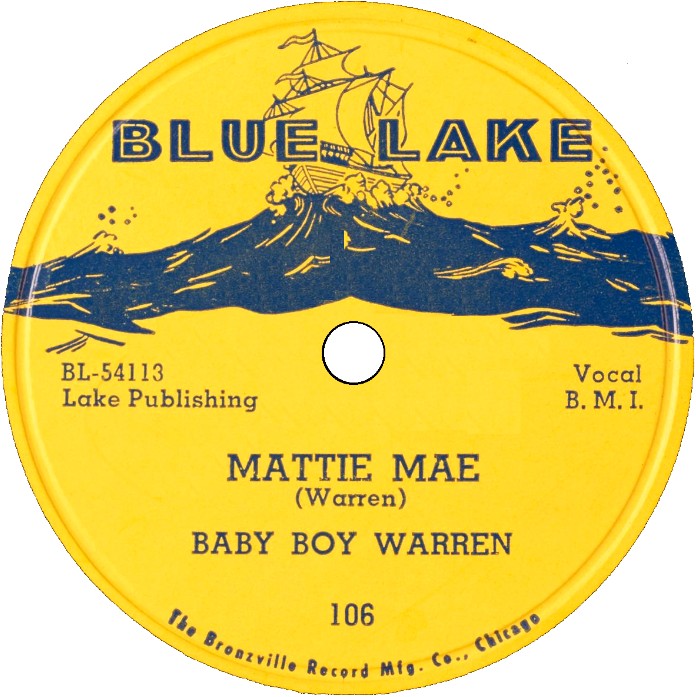
|
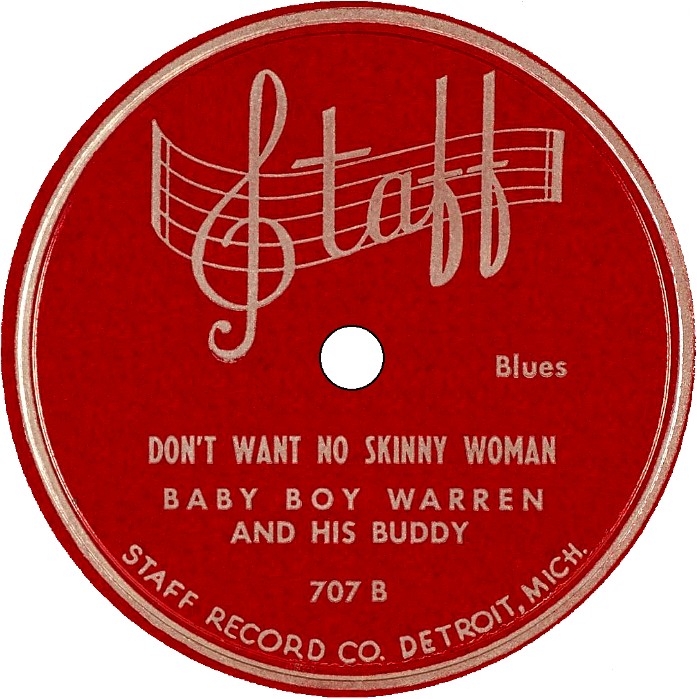
|
Above Left: Label image for Blue Lake 106, recorded in early 1954 and released in July 1954. As pointed out many times in these articles, stealing credit for songs written by other blues singers was rampant in the 1940s and early 1950s. "Mattie Mae Blues" was composed by Sonny Boy Williamson and released on record by him in 1941.
In 1954, Baby Boy Warren recorded with Sonny Boy Williamson for Joe Von Bottle's JVB Records and Excello Records.
Above Right: Label image for Staff 707 B, released in August 1948. Baby Boy's Buddy is Charlie Mills on piano.
At Direct Right: Photo of Baby Boy Warren.
Cash Box Review (1/21/50):
BABY BOY WARREN — Staff 707 — Don't Want No Skinny Woman/Lonesome Cabin Blues
Wax that might surprise ops and take hold with music fans is this platter by Baby Boy Warren tagged "Donít Want No Skinny Woman" and "Lonesome Cabin Blues". Both ends of the biscuit are in the blues vein, and have Warren and his "Buddy" turning in a top notch performance.Disk has loads of infectious melody behind it and lingers long after the first earful. Itís the type of platter that has to be heard in order to be fully appreciated—and thatís just what we recommend.
(NOTE: The Billboard's reviewer of this record was unimpressed, giving it a rating of 52/51 (out of 100), "satisfactory"(40-69).)
LISTEN (Windows Media Player):
1. "Mattie Mae" - Baby Boy Warren - Blue Lake 106 - 1954.
2. "Santa Fe" - Baby Boy Warren - Blue Lake 106 - 1954.
3. "Don't Want No Skinny Woman" - Baby Boy Warren And His Buddy - Staff 707 B - 1950.
4. "Lonesome Cabin Blues" - Baby Boy Warren And His Buddy - Staff 707 A - 1950.ALL FOUR SONGS played in sequence.
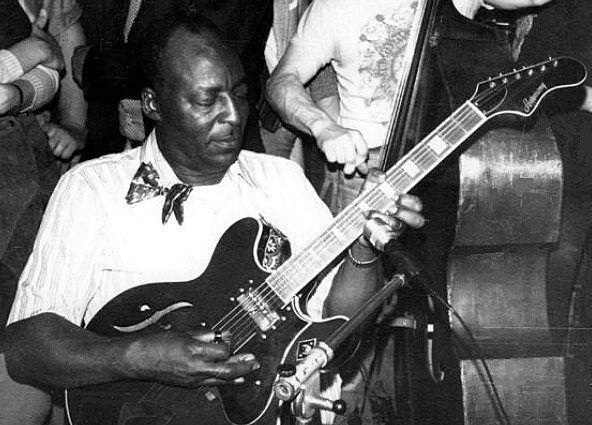
PARROT AND BLUE LAKE RECORDS - PART FOUR CONTINUES COVERAGE OF THE BLUE LAKE LABEL UNTIL ITS CONCLUSION. PARTS THREE AND FOUR INCLUDE EVERY KNOWN RECORD RELEASED ON THE BLUE LAKE LABEL.
PARROT AND BLUE LAKE RECORDS - PART ONE FEATURES THE PARROTS, THE CHOCOLATEERS, CURTIS JONES, COLEMAN HAWKINS, LOWELL FULSON, THE ROCKETTES, THE PELICANS, THE VICTORETTES, PAUL BASCOMB, THE ORCHIDS, AND JOHN BRIM. ALSO INCLUDED IS A LARGE SECTION ON AL BENSON, CHICAGO DEEJAY AND OWNER OF PARROT/BLUE LAKE RECORDS.
PARROT AND BLUE LAKE RECORDS - PART TWO FEATURES THE FIVE THRILLS, MABEL SCOTT, J. B. LENORE, THE FLAMINGOS, DUSTY BROWN, ST. LOUIS JIMMY, JO JO ADAMS, ERNEST LEWIS, ALBERT KING, AND WILLIE MABON.
ALSO INCLUDED IS AL BENSON'S LAST RECORD, AL BENSON CLIPPINGS, AND AL BENSON TRIBUTE RECORDS. THE SPOTLIGHTED SONG IS "KO KO MO".
PARROT AND BLUE LAKE RECORDS - PART FOUR (BLUE LAKE RECORDS - PART TWO) FEATURES LOU MAC, WALTER SPRIGGS AND THE FIVE ECHOES, THE MAPLES, THE FASCINATORS, LITTLE WILLY FOSTER, THE FIVE CHANCES, LITTLE PAPA JOE (JODY WILLIAMS), AND LEON TARVER.
Listen to all of this article's audio selections using Windows Media Player:
|
1. "Summertime" - Red Saunders And His Orchestra - Blue Lake 101 - 1954.
ALL SIXTEEN ABOVE BLUE LAKE LABEL SONGS played in sequence.
|
Last Update: October 9, 2023
E-mail Me: